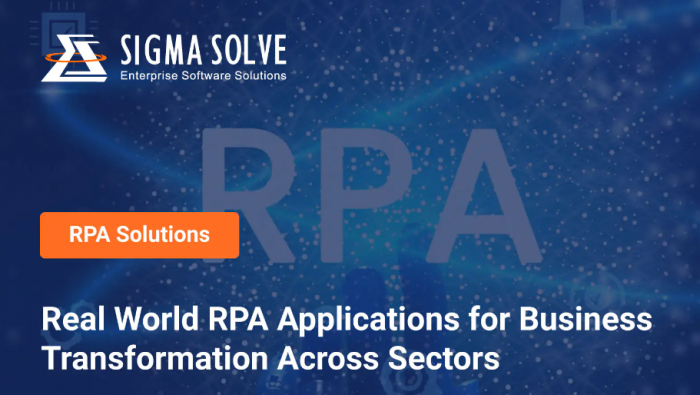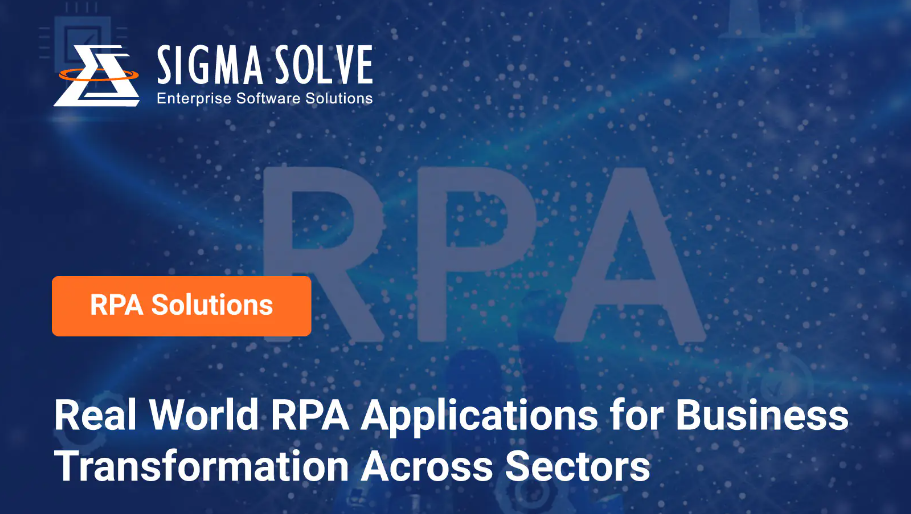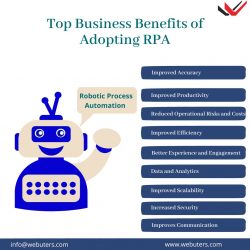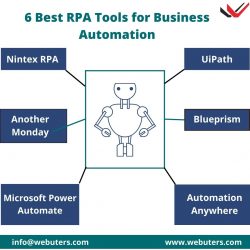Real World RPA Applications for Business Transformation Across Sectors – Sigma Solve Inc
RPA is the most critical technology that delivers unmatched efficiency, cost-efficiency, and accuracy to transform industries into a powerhouse of automation to bring real comfort to humans.
What is Robotic Process Automation?
Known as software robotics, the Robotic Process Automation (RPA) mimics the repetitive tasks usually performed by humans in a business environment. At its core, RPA is a way of automating business processes by deploying software-generated bots. Usually, this automation involves emerging cognitive technologies, such as Artificial Intelligence (AI) and Machine Learning (ML). The basic objective of RPA is to perform repetitive tasks quickly and without errors to improve productivity and accumulate data for insights needed to make smart decisions.
The Rise of RPA
In a nutshell, robotic process automation does what every business expects: it increases productivity and reduces costs. If the business processes are sped up without human intervention to eliminate manual errors, it is going to streamline the workflow and untangle the business operations. Consequently, it enables businesses to generate accurate insights and improve total experiences. According to Fortune Business Insights, globally, RPA is expected to grow at a healthy CAGR rate of 20.3%, from 13.86 billion in 2023 to 50.50 billion in 2030.
The Significance
We all have seen science fiction movies. Let me show you some business fiction. Visualize this: The humans are replaced with programmed robots working 24*7, taking over repetitive tasks, making no mistakes, innovating new ideas, and managing oceans of data effortlessly—this is robotic process automation for us in the future. RPA is the most critical technology that delivers unmatched efficiency, cost-efficiency, and accuracy to transform industries into a powerhouse of automation to bring real comfort to humans.
The Reach
From scuttling Wall Street trading floors to the whispering of Midwestern factories, RPA is silently penetrating the operations of every industry. These software bots are taking over manual tasks and performing better than humans. Manufacturing, healthcare, retail, finance, customer care, real estate, telecom, banking, insurance, defense—you name it, and you will see RPA quickly revolutionizing business processes through automation. Let’s witness how RPA is revolutionizing each industry in the US.
Manufacturing Sector:
Businesses can automate enumerable tasks in the manufacturing sector using RPA, starting from production planning to quality control and inventory management to invoice processing to customer service. Businesses can train bots to perform tasks intelligently, leveraging artificial intelligence and machine learning. For example, car manufacturing is expected to have 75% of its production processes automated using RPA.
The future of RPA in the manufacturing sector:
Predictive maintenance: Bots will be able to take a cue from production insights to analyze machine failure and recommend timely maintenance to reduce downtime.
Supply chain management: Automation will be able to enhance purchasing stock and inventory management to improve vendor management.
eCommerce and Retail Sector:
In retail, PRA is already saving a lot of time and effort by automating inventory management, order processing, category management, price review, invoice generation, and customer service. Consequently, eCommerce businesses utilize their employees for more productive tasks to improve efficiency. For example, drones are utilized for last-mile delivery to improve customer experiences and increase revenue.
The future of RPA in the retail sector:
Personalization: RPA bots can evaluate customer data to recommend products based on customers’ choices and purchase timing.
Fraud detection: Businesses can leverage AI with RPA to detect suspected transactions to monitor, detect, and prevent fraud.
Healthcare Sector:
Admission management, patient verification, treatment management, and the insurance process are only a few areas where businesses in the healthcare sector can leverage RPA to ensure that patients are diagnosed accurately and treated per medical norms. Many time-consuming processes linger because of human interventions that can be automated to focus on healthcare and recovery. Consequently, hospitals can treat more people with proper patient management.
The future of RPA in the healthcare sector:
Patient management: Virtual assistants can be deployed to manage registration, diagnosis, treatment, and medication swiftly.
Disease prediction: RPA bots can easily analyze the disease data, centralize them, and help authorities prevent disease spreading.
Banking Sector:
Finance is one of the most conducive sectors for RPA implementation, as there are a range of tasks that have a repetitive and time-consuming nature. Moreover, RPA effectively organizes data, prepares reports, and generates insights that are vital for the banking sector. Finance is one of the most digitized sectors in the world. Therefore, RPA penetration is swift and efficient in the banking sector. From loan processing to fraud direction and back office and reporting to customer service, the banking sector can leverage RPA to its optimum level.
The future of RPA in the banking sector:
RPA bots can evaluate the financial performance of individuals and suggest investment options or manage their wealth effectively.
Risk Assessment: Based on the income and expense data, RPA can analyze the risk of offering credit to individuals and businesses.
Logistics Sector:
The logistics sector is one of the most isolated sections with respect to technological intervention. Nonetheless, RPA has effectively penetrated the logistics sector, along with logistics CRM in the US. From lead management and distribution to order management and delivery management to load visibility, RPA can streamline many business processes in logistics businesses to ensure that businesses improve customer experiences, deliver on time, manage drivers effectively, and improve ROI considerably.
The future of RPA in the logistics sector:
Lead distribution: Logistics businesses often miss business opportunities due to inefficient lead distribution to the right salesperson; RPA can fix this problem.
Supply chain management: The entire supply chain can be streamlined and made absolutely secure by integrating blockchain technology into automation solutions.
Conclusion:
Digital transformation is no longer a corporate hobby but a necessary prerequisite for businesses to improve workflow efficiency, streamline operations, reduce operational costs, enhance customer experiences, and increase revenue inflow. RPA powered by AI, ML, and blockchain technology makes a real difference for businesses to cut the clutter and gain a leading position in the industry.
For more info: https://sigmasolve.com/real-world-rpa-applications-for-business-transformation-across-sectors/




































